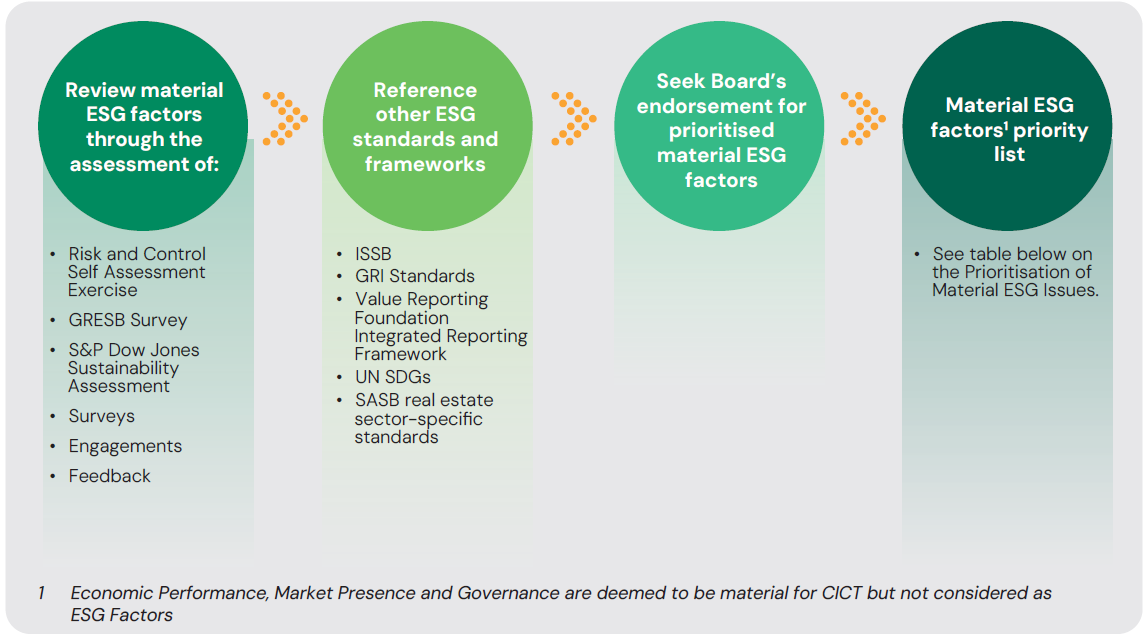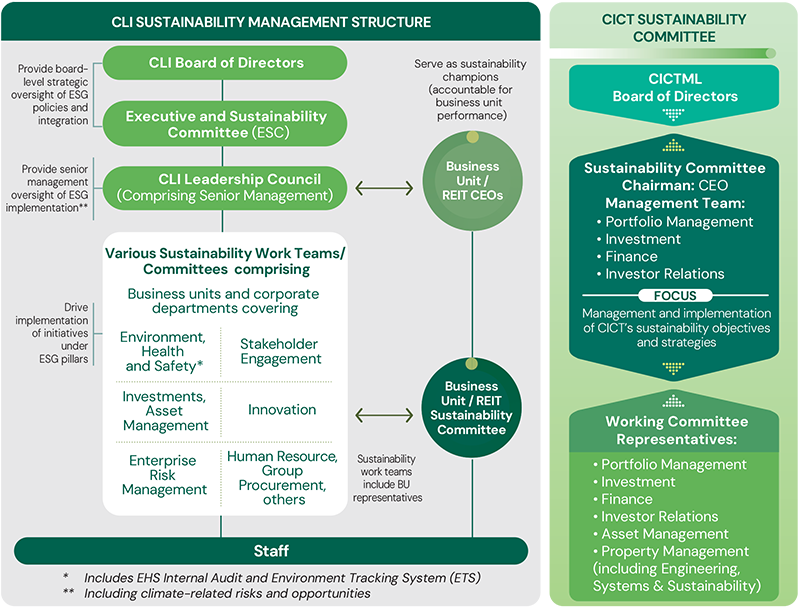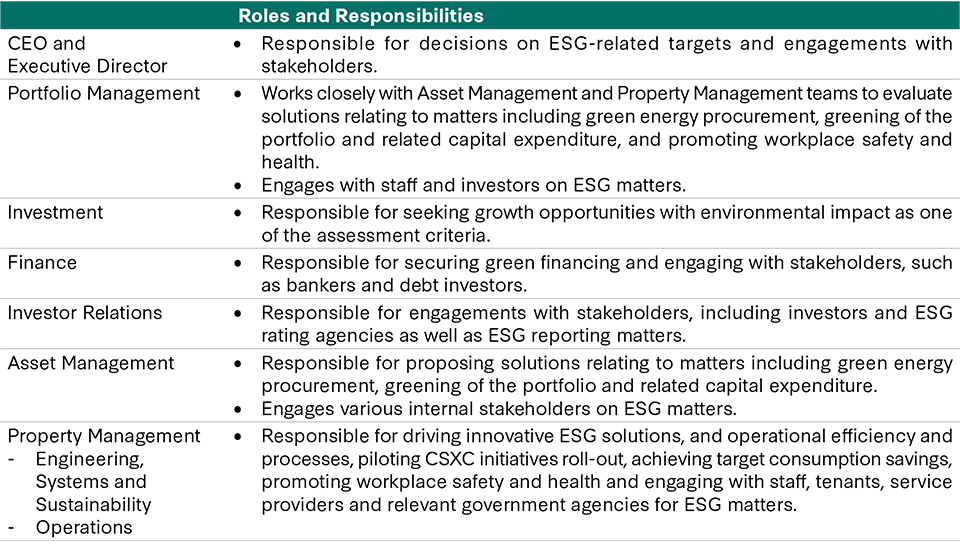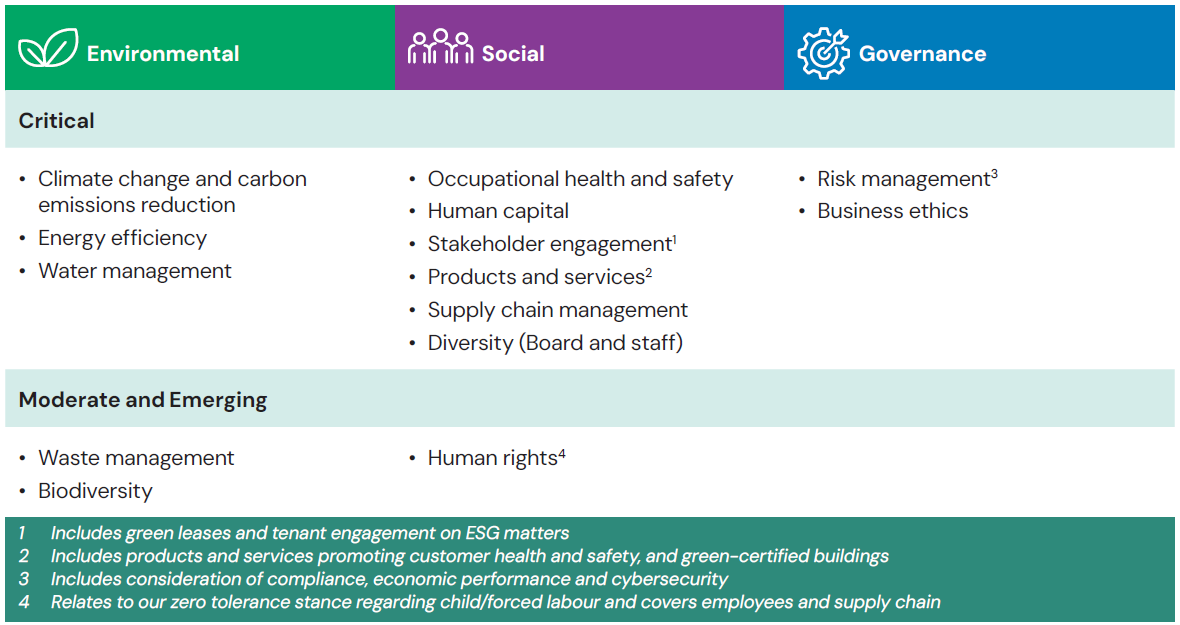Sustainability
ESG Focus
Sustainability Approach
Board Statement
At CICT, we are committed to growing in a responsible manner, by delivering long-term economic value and contributing to the environmental and social well-being of our communities. The operations of CICT's properties are managed by the property managers (which mainly comprise subsidiaries of CLI), in accordance with the property management agreements. The material ESG factors have been identified with set targets for 2030, considering CICT's business focus and in alignment with the CLI 2030 Sustainability Master Plan (SMP). Advancing towards a common set of goals, the CICTML Board has reviewed and endorsed the material ESG factors put up by the management team.
CICT's ESG factors aim to maximise impact through building portfolio resilience, optimising resources, enabling thriving and future-adaptive communities, and stewarding responsible business conduct and governance.
The CICTML Board is responsible for overseeing CICT's sustainability efforts and takes these ESG factors into consideration when determining its strategic direction and priorities. The CICTML Board also approves the executive compensation framework based on the principle of linking pay to performance. The Manager's business plans are translated to both quantitative and qualitative performance targets, including sustainable corporate practices.
Our sustainability performance has consistently been well-regarded by global indices such as FTSE4Good Index Series. The Manager will continue to identify and adopt meaningful ESG practices and enhance sustainability in the real estate sector.
CICT aligns its sustainability goals with CLI to achieve sustainable performance for its portfolio. Both CICTML and the property managers oversee CICT's business and operations, ensuring adherence to CLI's sustainability framework, policies, and guidelines, including its ethics and business conduct code. Guided by CLI's 2030 Sustainability Master Plan (SMP), CICT is committed to driving efforts to meet the SBTi-approved Scope 1 and 2 emissions reduction targets aligned with a 1.5°C trajectory1. CICT is also aligned with CLI's commitment to achieve Net Zero2 by 2050 for its Scope 1 and 2 emissions. Specific pathways are established for each ESG pillar and focus area, with strategies to evolve alongside advancements in technology and scientific research. Roadmaps and plans are developed to achieve CICT's sustainability objectives, which will enable the Trust to create a greater positive impact on both the environment and communities.
The CICTML Board endorses the material ESG issues that are most relevant and significant to CICT and its stakeholders, taking into consideration their relevance or impact to the business, strategy, financial planning, business model and key stakeholders. A double materiality approach is adopted, considering issues which are material from either the impact or financial perspectives1, or both. Potentially material ESG issues arising from activities across CICT and CLI's value chain - including immediate and longer term risks and opportunities - are identified primarily through ongoing engagement with the CICT team, CLI's business units and external stakeholders. In addition, we review various sources including investor questionnaires, and ESG surveys, benchmarks and frameworks such as GRESB and SASB to enhance our understanding of the industry's material ESG issues.
In addition, CICT has a regular process to review, assess and feedback in relation to ESG topics. Identified material issues are reported in a corporate risk register through the annual group-wide RCSA exercise2, which identifies, assesses and documents material risks and the corresponding internal controls to manage those risks. The material risks include fraud and corruption, environmental (including climate change), health and safety, and human capital which are ESG-relevant. Identified material ESG issues are then prioritised based on the likelihood and potential impact on CICT's business continuity.
For external stakeholders, priority is given to issues important to the community and applicable to CICT and CLI. In FY 2024, the ESG material topics were endorsed by the CICTML Board for their continued relevance. For more details, please refer to the Material Topics and Boundaries section of the Sustainability Report 2024.
Regular Review, Assessment and Feedback Process for Material ESG Factors

CREATING VALUE AND ALIGNMENT TO UNITED NATIONS SUSTAINABLE DEVELOPMENT GOALS (UN SDGS)
CICT-endorsed material ESG issues, along with the value created, adhere to the 2030 SMP focus areas and commitments. These are mapped to CICT's resources, which include Financial, People and Structure, Properties, Environment, and Stakeholders and Communities. They are also aligned with the eight UN SDGs that closely match the 2030 SMP focus areas, where CICT can make the most significant positive impact.
The UN SDGs call on companies everywhere to advance sustainable development through the investments they make, the solutions they develop, and the business practices they adopt. In doing so, the goals encourage companies to reduce their negative impacts while enhancing their positive contributions to the sustainable development agenda.
| Environment | |||
|---|---|---|---|
| Area of Focus | Our Commitments | ||
|
|
Environment Properties       |
|
|
|
||
|
|
||
| Social | |||
| Area of Focus | Our Commitments | ||
|
|
Stakeholders & Communities Properties     |
|
|
|
||
|
|
||
|
|
||
| Governance | |||
| Area of Focus | Our Commitments | ||
|
|
Stakeholders & Communities Organisational 
|
|
|
|
||
| Economic | |||
| Area of Focus | Our Commitments | ||
|
|
Financial | |




